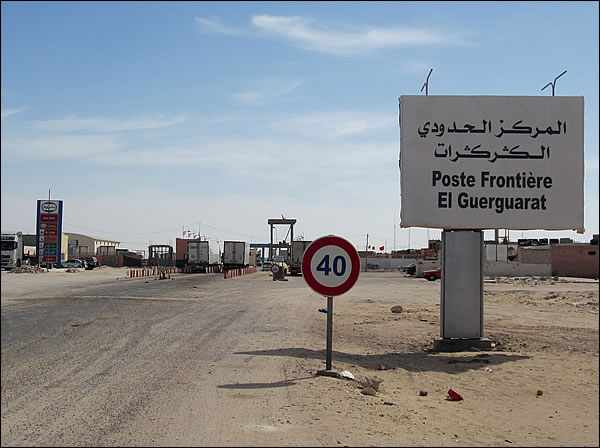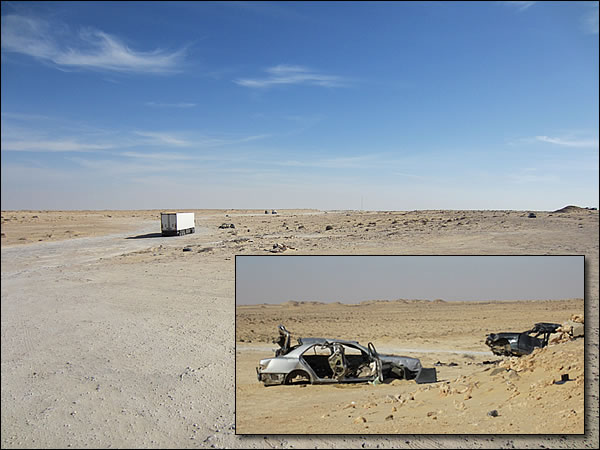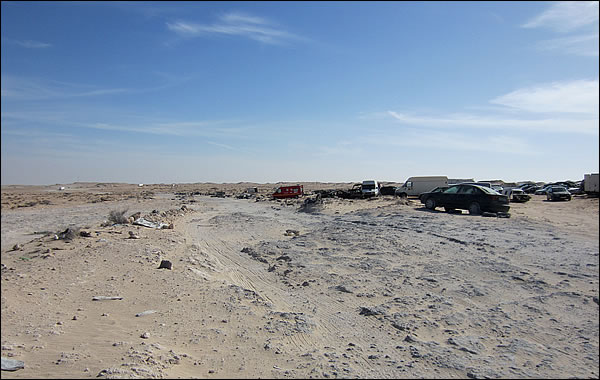Border crossings in Africa have a bit of a reputation. Some are straight forward while others are difficult to say the least. I didn’t expect the crossing from Morocco to Mauritania at Guerguarat to cause any problems as I had not heard any words of warning from other travelers or people with knowledge. Not that I have met a whole lot of people that travel in these areas at the moment but the few I have talked to have not mentioned any irregularities at the Guerguarat border crossing. But as I was about to experience there was quite a struggle heading in my direction.
When entering a new country there are a few documents you must have to satisfy the bureaucratic apparatus. First of all you must have a passport and most of the time in Africa you must also have a visa. Visas can in rare cases be had at the border itself but rules change frequently so it is better to apply for it in advance which is easiest done in a neighboring country. A normal 30 day tourist visa can cost anywhere between 10 and 100 Euros but typically the cost is in the range of 30 to 50 Euros. This cost varies depending on your nationality but also where you apply for the visa as different embassies have different rules.
At the border you will receive an entry form with general passport and travel information. This is handed over together with the passport at the appropriate window, hut or table in the sand. Some countries require that you have a yellow fever certificate if you arrive from countries where the decease is prevalent.
When you arrive at a border you have no idea how things work at this particular place and it is never obvious what is expected from you. Neither is there anyone that waits for you and points you in the right direction. Generally you have to stand there and look stupid until someone takes pity on you and points you in a diffuse direction towards a building that looks permanently closed or to a narrow slot in a window. There never seem to be a logical order of the process and you always have to visit at least a couple of different buildings, many times at opposite sides of the passage way.
Traveling with a vehicle, in my case a motorcycle, complicates things quite a bit. To bring the bike into a country I need a temporary import permit which comes at a cost at the border.
There is a document called “Carnet de Passages en Douane” which is an internationally recognized document that works as a guarantee that you will not sell your vehicle in the country into which it is brought. The “Carnet” is usually issued by the motor vehicle organization in your home country but it is only valid for one year or 25 entries/exits. In Sweden it cost about 475 Euros and most annoyingly, you need to deposit a substantial amount of money with the issuer depending on the value of the vehicle. If you for some reason do not have your vehicle with you when you return home you will lose the deposit.
Therefore have I chosen to travel without a Carnet and rely on that I can buy a temporary import permit at each border I cross. This may add up to more than the cost for the Carnet but at least I have not deposited a large amount of money that I risk to lose in case something unforeseen happens with the bike. There are some countries that are said to demand a Carnet but information varies on this point.
The registration papers for the vehicle will be needed when getting the temporary import permit. Driving license and international driving license may be asked for so it is best to have them at hand and of course there is a one year and a three year version of the international driving license. It varies between countries which one is recognized.
I always hand over copies of the documents, never the originals. You will understand why later. The only document that is presented in its original is the passport as the required stamps need to go in it. This is your weak spot when you run into the profiteers that you are forced to deal with at some borders. You must give them your passport and they know that you desperately need it back.
Back to the Guerguarat border crossing.

Each border crossing has two sets of border posts, one for each country. Normally there are two main control points at each border post; immigration and customs. But there might also be pre-, post- or intermediate stops in addition to this.
The passage through the Moroccan border post was straight forward but it still took 45 minutes despite that the place was almost empty. Border officials are seldom in a hurry and the little power they have been entrusted with is cherished as a valuable asset which it certainly can be if capitalized upon.
Between the two border posts there is a five kilometer stretch of no man’s land that is crossed on a rough dirt and rock road that winds its way across the desert landscape. It is said that either side of the road is heavily laden with land mines and that one should not stray too far off track. But as drivers tend to follow the route of least resistance, the track is divided into numerous paths and it is not altogether clear which one to follow. I chose to follow behind a big truck just in case.


This place has been used as a dump for old cars as technically the vehicles are in no country out here and the paperwork is thereby in good order. That vehicles shift hands while the border guards look the other way is a different matter.
Driving in to the Mauritanian border post I was back on the asphalt again and was immediately met by non-uniformed people that threw themselves in my face as soon as they saw me. My experience tells me that if someone pays you any attention at a border you know something dodgy is up and it is not like these people look like they belong there at all, even if they want to think so themselves.
First I entered a building on the left hand side. Here a uniformed official noted down my travel information in a ledger without any fuzz. Exiting the building I was in the hands of the scammers and they ushered me to a set of buildings on the right hand side of the road. I did my best to ignore them and elbowed my way to a uniformed man behind a desk. This was the official with the actual power which meant that he was in the possession of that desirable stamp that would see me through to the other side.
There were a number of scammers around that immediately started to talk about money and cost and threw ill-disguised threats about. Among them they talked most languages needed to make any tourist understand what they were after. I soon understood that this was the customs section of the border and that the scammers prepared the temporary import permits at an inflated cost, extremely inflated cost.
My attempt to seek help from the stamp official was fruitless as the guy stubbornly refused to talk anything but French. He just pointed in the direction of the scammers. This confirmed my suspicions that the whole place worked as a systematical money siphon. The scammers were there to handle the dirty work that the uniforms don’t want and indeed don’t need to deal with. The unofficial money collected is of course split between all people involved. I would think that the majority goes to the uniforms while the scammers get a small portion. I am sure that the bosses of the uniforms get their fare share of the cake in order to allow the scam to go on.
But to confuse things even more there were other travelers there that did pay the money and honestly believed in the stories they were told, even as they negotiated the fees.
One of the first stories that was put forward to me was that “normally” everyone need a police escort when passing through Mauritania but in “my special case” these un-uniformed scammers could make sure I was let off this requirement.
Total bullshit. Un-uniformed men have no authority to allow or forbid anything at a border crossing. I was told that it would cost me 100 Euros to get the temporary import permit. This was the fee that they expected me to pay for them to prepare the documents. Someone in the background prematurely lowered this to 60 Euros.
Total bullshit. Official fees at borders are never negotiable, not by uniformed men and certainly not by un-uniformed scoundrels.
I had a slight situation on my hands. Apparently the uniforms were in on the plot and there would be no help from them. After all, it was they who allowed the scammers to be here in the first place. How would I get through this with the least economical damage?
The only thing I could do was to hand over my passport and the copy of the registration document to one of the scammers and hope for the best, perhaps I could negotiate the fee to a reasonable level.
Off he went to a separate room while I sat down on a bench in a waiting hall. I leaned back, closed my eyes and pretended to sleep just to show them that I was in no hurry and that the extremely long time they took to prepare the documents didn’t bother me the least. I could sense several of the scammers walking pass me to check my reaction. I pretended to sleep on. In fact, it was quite nice to have a bit of rest after the long drive from Dakhla and the waiting hall was nice and cool.
I had arrived to the Mauritanian border post around three thirty in the afternoon and I knew it closed at six o’clock. I secretly checked the time when no one was around. At five thirty, after a good hour and a half, the papers were ready and I was handed back my passport and registration document which I immediately pocketed safely inside my motorcycle jacket. They had just handed over a big part of their negotiation power.
The scammers showed me the documents that they had just prepared. They consisted of two official papers and one hand written receipt that I had demanded during earlier discussions. Now we just needed to take these documents to the man in power to get them stamped but first it was the issue with the payment. And I had a big issue with it. A hundred Euros for preparing three simple documents that for any normally intelligent person would take five minutes, was nothing but right out robbery.
First I acted as if I would pay and had one of the guys to sit down and explain the documents to me. It turned out that the temporary import permit was valid for only fifteen days and could be extended at the customs office in the capital. Fine, now a very long discussion started. I told them that the hand written receipt was a joke and demanded an official receipt on official, printed paper with an official stamp which I knew they couldn’t produce. Demonstratively, I made no attempt to take the documents even when they were handed to me as I knew they were useless without the stamp.
There were four or five scammers standing around me where I sat on the bench acting as I didn’t care about either time nor documents but it was of course a slightly pulse-raising experience. Fortunately I have been in this situation many times before so I stood my ground.
When one of the guys, in an act of anger, tore the hand written receipt in pieces and threw it on the floor I knew that I had won. He had just taken one of their negotiation cards out of the equation. The receipt that I demanded did no longer exist. The other documents he handled very carefully.
The time was now close to six and the uniformed personnel started to close doors and lock the place up. I could see in the face of the scammers that they started to get desperate which only made me feel calm. They could not stay here any longer and they could not let me stay either. They threw threats around that I would be left here overnight. Fine, I told them. I just pitch my tent.
When the building was finally closed we all walked over to the other building where the man with the stamp sat. The scammers had the document stamped at the last moment before closure and then started to negotiate with me. Now they talked about 50 Euros but their game was already lost. I just ignored them and the document, turned and looked at the setting sun until they had had enough. Then they handed me the documents and I turned my back on them with a big smile on my face. Victory!
How good didn’t it feel after three hours of waiting and bullshitting.
Now, I had only to get my passport stamped at the immigration in a building on the left hand side of the road. This was executed by a uniformed officer in an orderly manner. It took two minutes.
Then, when I got back out on the road the scammer that had prepared the documents was there with a carload of his collaborators waiting in the background. A small group of people gathered around us including the official from immigrations. After a bit of arguing during which I refused to hand over any documents, the man from immigration acted as a negotiator and I gave the documents to him.
The scammer had during the previous confusion forgot about the official cost of the temporary import permit which he now pointed out on the papers that the immigration officer held on to. On the cluttered document, way down at the bottom of the page, it was written 3000 UM in very small writing. This was the official cost of the document which equals less than 10 Euros.
The guy that had tried to scam 100 Euros out of me only minutes before now demanded that I should pay him the official fee of 10 Euros. At this point, I got upset for the first time during this whole farce. In a forceful voice with my index finger pointing in his face, I told the scammer what a thief and scoundrel he was and that he could pay the fee himself. I then turned to the immigration officer and in a normal tone praised him for acting honorably and being a responsible official in contrast to the scum next to us.
In the end I got my documents without paying anything and the scammer had to go home with the tail between his legs.
Then I crossed the actual border where my passport was checked and I was directed to a “civil” insurance office just outside the barrier that marked the border. Insurance for the motorcycle is a real requirement that I believe is enforced in every country. I could choose from a ten, twenty or thirty day insurance and the thirty day insurance cost 30 Euros which according to researched information should be correct. I got official and stamped documents without asking.
Conveniently, there was also an exchange counter at the same place where I changed my last Moroccan Dirham at exactly the exchange rate that I had looked up on the Internet the day before, so no complaints there either.
Then off I rode into the Mauritanian sunset.
When reading this story it may seem like I swept the floor with the scammers and that I was unaffected by the whole episode. That is definitely not the case. It is very intimidating having four or five people in your face demanding money for services you’re not really sure are legitimate. They do this every day for a living and they are experts at making people feel insecure and subdued. They are telling you lies that sometimes can be hard to identify as such and when arriving at a new place you really do not know what is true and how things work.
Then there is the question if it is worth going through all this hassle and spending many hours arguing when the odds are against you. I’m not telling anyone how he or she should act. Perhaps it is better to do your best at negotiating the fees and debit them in the "unforeseen expenses" account.
This was only one border crossing and I have many more to go through. I am sure I will judge other situations differently and take a less troublesome route. The next border crossing on my list is the infamous Rosso crossing between Mauritania and Senegal, described as the worst border crossing in all of Africa and thereby in most of the world, one has to assume.
Anyway, I hope you enjoyed the story.
/AB
|







